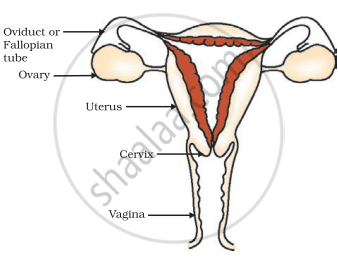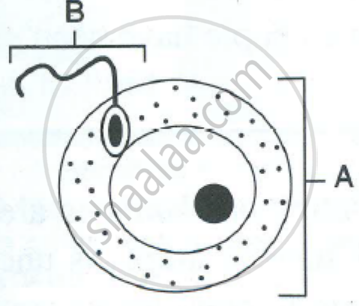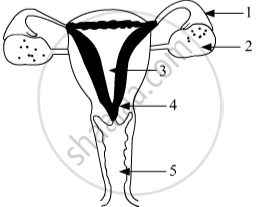Advertisements
Advertisements
Questions
Explain how the embryo gets nourishment inside the mother’s body.
State, in brief, how an embryo gets its nourishment inside the mother's body.
Explain how the developing embryo gets nourishment inside the mother's body.
Solution 1
After implantation, a disc-like special tissue called placenta develops between the uterus wall and the embryo. The placenta helps in the exchange of nutrients, oxygen and waste products between the embryo and the mother. Thus, it provides nourishment to the growing embryo.
Solution 2

The embryo develops inside the mother’s body for about nine months. Inside the uterus, the outer tissue surrounding the embryo develops finger-like projections called villi. These villi are surrounded by uterine tissue and maternal blood. They provide a large surface area for the exchange of oxygen and nutrients. There is a special tissue called placenta embedded in the uterine wall. The embryo receives the oxygen and nutrients from the mother’s blood via the placenta. The waste material produced by the embryo is removed through the placenta.
APPEARS IN
RELATED QUESTIONS
Name any three parts of the female reproductive system in human beings. Write one function of each.
Describe placenta structure.
Write the functions of the following parts in human female reproductive system:-
(i) Ovary
(ii) Oviduct
(iii) Uterus
Give scientific reasons: When an ovum gets fertilized, menstrual cycle stops temporarily in a woman.
Match the Column:
| no | Column A | Column B |
| 1 | Allele | Control of automobile exhaust |
| 2 | Leydig cells | Tourniquet |
| 3 | Utriculus | Alternate forms of genes |
| 4 | Snake bite | Dynamic equilibrium |
| 5 | Euro IV norms | Testosterone |
| Sudden change in genes | ||
| Static equilibrium |
How long does a human baby take to develop before birth?
Draw a labelled diagram of the human female reproductive system. With the help of this diagram, explain the working of human female reproductive system.
In human males, the testes lie in the scrotum outside the body because it helps in the
(a) process of mating
(b) formation of sperms
(c) easy transfer of sperms
(d) all the above
The diagram below represents two reproductive cells A and B. Study the same and then answer the questions that follow:
 |
- Identify the reproductive cells A and B.
- Name the specific part of the reproductive system where the above cells are produced.
- Where in the female reproductive system do these cells unite?
- Name the main hormones secreted by the (1) ovary (2) testes.
- Name an accessory gland found in the male reproductive system and state the function of its secretion.
Describe in brief the role of testis in human male reproductive system.
Choose the correct answer:
First menstrual cycle is known as ___________
Give the function of the following:
Uterus
Answer the following question:
Why are family planning measures needed in our country?
Identify the given diagram.
Name the parts 1 to 5. 
Explain the term Parturition or birth.
Choose the Odd One Out:
What is inhibin? State its functions.
Mention the importance of the position of the testes in humans.
How does human sperm locomote?
Match Columns I and II and select the correct option.
| Columns I | Columns II | ||
| i. | Transfer of sperms in the female genital tract. | a. | Gestation |
| ii. | Delivery of baby | b. | Fertilization |
| iii. | Fusion of male and female gamete. | c. | Parturition |
| iv. | Formation of sperms and ovum | d. | Insemination |
| e. | Gametogenesis |
